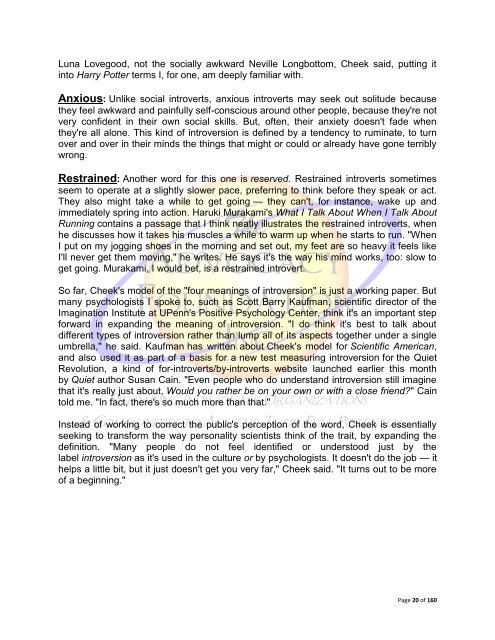The Gift of Introversion
The Gift of Introversion
The Gift of Introversion
Create successful ePaper yourself
Turn your PDF publications into a flip-book with our unique Google optimized e-Paper software.
Luna Lovegood, not the socially awkward Neville Longbottom, Cheek said, putting it<br />
into Harry Potter terms I, for one, am deeply familiar with.<br />
Anxious: Unlike social introverts, anxious introverts may seek out solitude because<br />
they feel awkward and painfully self-conscious around other people, because they're not<br />
very confident in their own social skills. But, <strong>of</strong>ten, their anxiety doesn't fade when<br />
they're all alone. This kind <strong>of</strong> introversion is defined by a tendency to ruminate, to turn<br />
over and over in their minds the things that might or could or already have gone terribly<br />
wrong.<br />
Restrained: Another word for this one is reserved. Restrained introverts sometimes<br />
seem to operate at a slightly slower pace, preferring to think before they speak or act.<br />
<strong>The</strong>y also might take a while to get going — they can't, for instance, wake up and<br />
immediately spring into action. Haruki Murakami's What I Talk About When I Talk About<br />
Running contains a passage that I think neatly illustrates the restrained introverts, when<br />
he discusses how it takes his muscles a while to warm up when he starts to run. "When<br />
I put on my jogging shoes in the morning and set out, my feet are so heavy it feels like<br />
I'll never get them moving," he writes. He says it's the way his mind works, too: slow to<br />
get going. Murakami, I would bet, is a restrained introvert.<br />
So far, Cheek's model <strong>of</strong> the "four meanings <strong>of</strong> introversion" is just a working paper. But<br />
many psychologists I spoke to, such as Scott Barry Kaufman, scientific director <strong>of</strong> the<br />
Imagination Institute at UPenn's Positive Psychology Center, think it's an important step<br />
forward in expanding the meaning <strong>of</strong> introversion. "I do think it's best to talk about<br />
different types <strong>of</strong> introversion rather than lump all <strong>of</strong> its aspects together under a single<br />
umbrella," he said. Kaufman has written about Cheek's model for Scientific American,<br />
and also used it as part <strong>of</strong> a basis for a new test measuring introversion for the Quiet<br />
Revolution, a kind <strong>of</strong> for-introverts/by-introverts website launched earlier this month<br />
by Quiet author Susan Cain. "Even people who do understand introversion still imagine<br />
that it's really just about, Would you rather be on your own or with a close friend?" Cain<br />
told me. "In fact, there's so much more than that."<br />
Instead <strong>of</strong> working to correct the public's perception <strong>of</strong> the word, Cheek is essentially<br />
seeking to transform the way personality scientists think <strong>of</strong> the trait, by expanding the<br />
definition. "Many people do not feel identified or understood just by the<br />
label introversion as it's used in the culture or by psychologists. It doesn't do the job — it<br />
helps a little bit, but it just doesn't get you very far," Cheek said. "It turns out to be more<br />
<strong>of</strong> a beginning."<br />
Page 20 <strong>of</strong> 160

















